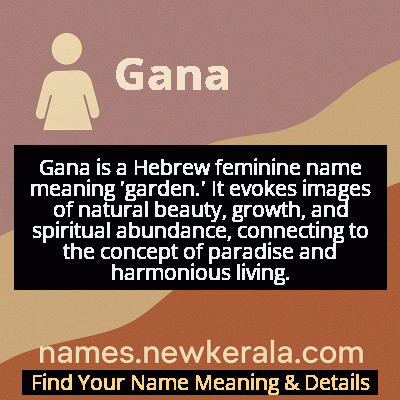Gana Name Meaning & Details
Origin, Popularity, Numerology Analysis & Name Meaning of Gana
Discover the origin, meaning, and cultural significance of the name GANA. Delve into its historical roots and explore the lasting impact it has had on communities and traditions.
Name
Gana
Gender
Female
Origin
Hebrew
Lucky Number
5
Meaning of the Name - Gana
Gana is a Hebrew feminine name meaning 'garden.' It evokes images of natural beauty, growth, and spiritual abundance, connecting to the concept of paradise and harmonious living.
Gana - Complete Numerology Analysis
Your Numerology Number
Based on Pythagorean Numerology System
Ruling Planet
Mercury
Positive Nature
Adventurous, dynamic, curious, and social.
Negative Traits
Restless, impatient, inconsistent, prone to indulgence.
Lucky Colours
Green, white.
Lucky Days
Wednesday.
Lucky Stones
Emerald.
Harmony Numbers
1, 3, 9.
Best Suited Professions
Sales, marketing, travel, entertainment.
What People Like About You
Versatility, charisma, adventurous spirit.
Famous People Named Gana
Gana Bayarsaikhan
Actress and Model
International modeling career and film roles bridging Eastern and Western entertainment industries
Gana Mkhitaryan
Singer
Popular folk and pop singer known for preserving Armenian musical traditions
Gana Weinstock
Educator
Pioneer in early childhood education and founder of innovative learning methods
Name Variations & International Equivalents
Click on blue names to explore their detailed meanings. Gray names with will be available soon.
Cultural & Historical Significance
Throughout Jewish history, gardens have represented both physical and metaphorical spaces of growth, reflection, and connection to the divine. The name Gana thus carries connotations of fertility, nurturing, and the cultivation of both physical and spiritual life. In modern Israeli culture, the name maintains its connection to the land and nature, reflecting the Zionist ideal of returning to and cultivating the ancestral homeland, while also embracing contemporary values of environmental stewardship and natural beauty.
Extended Personality Analysis
Women named Gana are often perceived as nurturing, grounded individuals with a deep appreciation for beauty and harmony. They tend to possess a calm, centered presence that others find comforting and stabilizing. Like a well-tended garden, they exhibit patience in their relationships and endeavors, understanding that meaningful growth requires time and care. Their connection to the name's garden symbolism often manifests in a love for nature, art, and creating beautiful environments.
Ganas typically demonstrate strong intuitive abilities and emotional intelligence, making them excellent listeners and counselors. They have a natural talent for helping others grow and flourish, much like a gardener tends to plants. While they may appear gentle, they possess inner strength and resilience, able to weather life's challenges with grace. Their creative expression often leans toward practical arts, environmental causes, or healing professions where they can manifest their innate desire to cultivate beauty and wellbeing in the world around them.
Modern Usage & Popularity
In contemporary times, Gana remains a relatively uncommon but meaningful choice among Hebrew-speaking communities and those with Jewish heritage. The name has seen steady but modest usage in Israel, often chosen by parents seeking a name that connects to nature and tradition without being overly common. While not among the top popular names, it maintains a presence in artistic and environmentally-conscious circles. Internationally, Gana appears occasionally in diaspora communities, sometimes chosen for its beautiful sound and spiritual connotations rather than strict religious adherence. The name's simplicity and cross-cultural appeal make it accessible while retaining its distinctive Hebrew character.
Symbolic & Spiritual Meanings
Symbolically, Gana represents the cultivated space where nature and human care intersect—a metaphor for personal growth, spiritual development, and harmonious living. Like a garden, it symbolizes the potential for beauty to emerge from intentional nurturing and the cyclical nature of life, death, and rebirth. The name carries connotations of sanctuary and refuge, suggesting a person who provides shelter and nourishment to others. It also embodies the idea of paradise regained through conscious living and connection to the natural world, representing both earthly beauty and spiritual aspiration in balanced measure.

